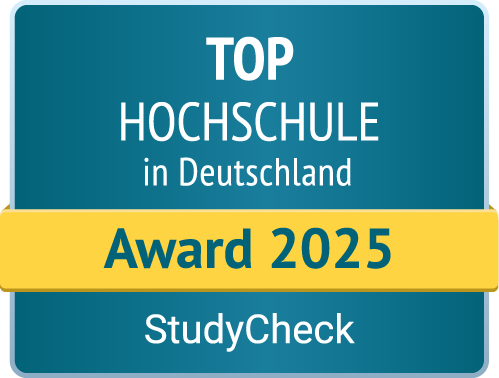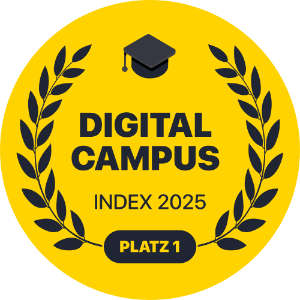Faculty of Engineering
Applied Research in Engineering
Sciences (APR)

Study overview
The Applied Research in Engineering Sciences (APR) master's programme is a research-oriented master's programme. It is linked to a research project at Ansbach University of Applied Sciences (funding or industrial projects) which is carried out over 3 semesters.
The master's programme is run in collaboration with the universities of Amberg/Weiden, Ansbach, Augsburg, Deggendorf, Ingolstadt, Landshut, Munich, Nuremberg and Regensburg.
It is possible to start the programme in any semester.
| Short form | APR |
| Type of study | Full time |
| Standard period of study | 3 semester |
| Award | Master of Science (M.Sc.) |
| Start of studies | Winter semester & summer semester |
| Admission restrictions | specific |
| Lecture location | Ansbach |
| Language of instruction | German |
| Course management | Prof. Dr. Christian Uhl |
| Student advisory service | Prof. Dr. Christian Uhl |
| Student Services | studierendenservice.apr(at)hs-ansbach.de |
Admission requirements
Students must fulfil the following two criteria for admission to the programme:
1. Minimum good grade average (i.e. min. grade 2.5 or above) in the diploma of a qualifying higher education programme (usually a bachelor's or diploma programme).
2. Proof of suitability for the specific study programme (selection interview with two professors).
Important:
Students are also expected to contact the head of the master’s programme, Prof. Dr. Wolfgang Schlüter, in advance. An application without prior contact is not recommended!
Details of the mandatory admission requirements can be found in the study and examination regulations of the programme.
Study structure
The master's programme Applied Research in Engineering Sciences (APR) is a research-oriented master's programme for highly qualified Bachelor graduates and young professionals.
The master’s programme offers students the following advantages, among others:
- Preparation for management and specialist positions in the field of applied research and development.
- The demonstration of in-depth technical knowledge, together with the abilityto implement this knowledge in a real-life, practical project.
- Direct preparation for typical tasks in the research and development departments of business and industry.
- In the case of cooperative research projects, close contacts can be established with potential future employers.
- Highly qualified graduates are directly prepared for (collaborative) doctoral studies by the scientific orientation or the course and the requisite scientific publication.
The Master Research Program is a multidisciplinary master's programme which generally does not require a specialist subject. The MRP is therefore particularly suitable for Bachelor graduates of the Faculty of Engineering at Ansbach University of Applied Sciences.
Additional notes:
- You must earn 30 ECTS per semester.
- Depending on the research project chosen, the compulsory elective modules must be selected in consultation with the supervising professor at the beginning of the course from the catalogue of approved compulsory elective modules.
- In order to enrol in the course, a qualifying university degree of mid. 210 ECTS is required. Missing ECTS can be made up. For details, see the study and examination regulations.
For further details on the APR study structure, please visit:
https://www.th-nuernberg.de/studiengang/applied-research-in-engineering-sciences-msc-1/
Application for studies
Applications can only be submitted online via the website of Ansbach University of Applied Sciences. Further information on the general application criteria and procedure can be found here:
Submission deadlines:
- Summer semester: 15.11. - 15.01. (deadline)
- Winter semester: 02.05. - 15.07. (deadline)
Please note:
- Before you apply, please make sure you contact the supervising professor and the head of the degree programme in good time!
- The application is for the degree programme, not for a specific project, i.e. the applicant’s suitability for the degree programme will be assessed (not the project!).
- The formal admission criteria for the study programme are set out in the Study and Examination Regulations for the study programme (cf. §8-§10).
- Applications for admission to the programme are generally possible in both the summer and the winter semester.
- If you have any questions, please contact the head of the study programme.
Information about companies
The Master's programme, Applied Research in Engineering Sciences, offers excellent opportunities for cooperation between companies and Ansbach University of Applied Sciences.
These are some of the specific advantages for companies:
- The opportunity to expand their own research and development department: A research project within the scope of the Master Research Programme may offer a company an ideal opportunity to temporarily increase their R&D capacities. Highly innovative and therefore often risky assignments are particularly suitable for cooperative research projects.
- Engagement with comprehensive research projects over a longer period of time: In bachelor theses and internships, deeper questions and tasks can often only be dealt with unsatisfactorily due to time restrictions. The Master Research Programme goes beyond these narrow limits and is structured to provide the necessary time and focus to solve comprehensive problems.
- The transfer of knowledge and experience with Ansbach University: Benefit from the advantages of cooperation with Ansbach University, such as years of experience with research projects, access to the latest research in the field, constructive unblinkered solutions, access tofunding for cooperative research projects, etc.
- Get to know new employees under realistic conditions: After one and a half or three years of working together on a research project, you get to know the student and the student becomes familiar with your company - if everything fits, you can immediately put your new employee(s) to productive use!
- Retain employees with high potential and keep them in the company over the long term: Offer your qualified and motivated employees the opportunity to pursue a Master of Science (MSc) in a corporate context. Research projects with a direct relation to research and development tasks in your company provide an ideal opportunity to remain in direct contact with your employees whilst at the same time supporting them in a targeted way.
Have you recognized the advantages of the Applied Research in Engineering Sciences Master's programme for your company and would you like to propose a joint research project? Or would you like to find out more and clarify specific questions without obligation?
We would be pleased to hear from you. Simply contact us – a trusted professor at Ansbach University of Applied Sciences or the course director will be happy to help you and support you in formulating a collaborative research project.
The head of the master's programme will be happy to answer any further questions you may have: Prof. Dr. Christian Uhl.
Further Information

Excellent career opportunities
Applied-research and development (aFuE) is an important basis for innovation, which in turn is a decisive factor for the competitiveness of the German economy.
Small and medium-sized enterprises (SMEs) in particular are faced with the problem that aFuE is usually time-consuming, knowledge-intensive and costly. For SMEs, therefore, innovations which are often vital are difficult to implement long term.
The primary aim of the Applied Research in Engineering Master's programme is to provide companies with employees who are able to play a decisive role within aFuE projects in a very short period of time and thus to strengthen their innovative ability in a sustainable manner.
Consequently, companies have the opportunity, throughout the entire duration of a cooperative aFuE project, to inspire future graduates with challenging tasks in the field of research and development. In return, the students receive an intensive insight into the participating companies right from the start and gain immediate practical and relevant experience.
The Master's programme opens the door to a cooperative doctorate for highly qualified graduates who would like to qualify further in the field of aFuE.
Further information about...
- Opportunities and possibilities for prospective students can be obtained from the study consultant Prof. Dr. Wolfgang Schlüter.
- Details of collaborative opportunities for companies can be obtained from the course director Prof. Dr. Wolfgang Schlüter.

At the Ansbach University of Applied Sciences
At Ansbach University of Applied Science , the central theme of the Master's programme is practice-oriented applied research and development in the areas of
- Energy systems and energy economy
- Plastics technology
- Sustainable building technology
- Production and automation technology
- Physical technology
- Biomedical Engineering
- Industrial Biotechnology
- and related fields.
In the Master's programme, this orientation is manifested in a central research project that the students intensively pursue over a period of three semesters.
At the start of their studies, students select one of the research projects offered from the project pool of the Master's programme. Research projects either arise within the framework of ongoing research work at the university or as a result of requests from industry and business ("extended research laboratory"). As soon as the central research questions and the objectives of the project have been defined, a professor from the university places the project in the project pool.
Staff

Ralph-Peter Kappestein
Leiter Studierendenservice der School of Business and Technology (SBT)
0981 203633-16 oder 0981 4877-143 BHS 3.02 (Brauhausstraße 15, 91522 Ansbach) nach Vereinbarung ralph-peter.kappestein vCard
Ralph-Peter Kappestein

0981 203633-16 oder 0981 4877-143
BHS 3.02 (Brauhausstraße 15, 91522 Ansbach)
nach Vereinbarung
ralph-peter.kappestein
vCard
Leiter Studierendenservice der School of Business and Technology (SBT)
Funktionen:
- Leiter Studierendenservice der School of Business and Technology (SBT)

Agnes Rutkowski
Fakultätsassistentin Fakultät Technik
0981 4877-584 92.2.42 nach Vereinbarung agnes.rutkowski(at)hs-ansbach.de vCard
Agnes Rutkowski

Fakultätsassistentin Fakultät Technik
Funktionen:
- Fakultätsassistentin Fakultät Technik
Betreute Studiengänge:
- Angewandte Kunststofftechnik (AKT)
- Applied Research in Engineering Sciences (APR)
- Energiemanagement und Energietechnik (EMT)

Prof. Dr. Christian Uhl
Studiengangsleiter Applied Research in Engineering Sciences (APR) / Studienfachberatung Applied Research in Engineering Sciences (APR)
Prof. Dr. Christian Uhl

Studiengangsleiter Applied Research in Engineering Sciences (APR) / Studienfachberatung Applied Research in Engineering Sciences (APR)
Funktionen:
- Studiengangsleiter Applied Research in Engineering Sciences (APR)
- Professor Biomedizinische Technik (BMT)
- Studienfachberatung Applied Research in Engineering Sciences (APR)
- Vorsitzender Prüfungskommission Biomedizinische Technik (BMT)
- Leiter Kompetenzzentrum Center for Signal Analysis of Complex Systems (CCS)
Lehrgebiete:
- Angewandte Mathematik
- Signal- und Datenverarbeitung
Vita:
- Studium: Physik-Studium an der Universität Stuttgart und der University of Oregon
- Promotion: Institut für Theoretische Physik und Synergetik der Universität Stuttgart im Bereich der raum-zeitlichen Signalverarbeitung
- Industrie- und Forschungstätigkeiten: Medizinische Bild- und Signalverarbeitung am Max-Planck-Institut für Neuropsychologische Forschung in Leipzig, Automatische Spracherkennung in den Philips GmbH Forschungslaboratorien in Aachen
- seit 2001: Professor an der Hochschule Ansbach
- WS 2008/09 & WS 2011/12: Gastaufenthalte am Department of Biomedical Engineering der University of California Irvine
Publikationen:

Prof. Dr.-Ing. Michael S. J. Walter
Vorsitzender Prüfungskommission Applied Research in Engineering Sciences (APR)
0981 4877-559 92.1.43 nach Vereinbarung (persönliche Sprechstunde) / Donnerstag 10.000-11.00 Uhr (Studiengangsleiter-Sprechstunde) michael.walter vCard
Prof. Dr.-Ing. Michael S. J. Walter

0981 4877-559
92.1.43
nach Vereinbarung (persönliche Sprechstunde) / Donnerstag 10.000-11.00 Uhr (Studiengangsleiter-Sprechstunde)
michael.walter
vCard
Vorsitzender Prüfungskommission Applied Research in Engineering Sciences (APR)
Funktionen:
- Studiengangsleiter Nachhaltige Ingenieurwissenschaften (NIW)
- Studiengangsleiter Media Systems Engineering (MSE)
- Vorsitzender Prüfungskommission Applied Research in Engineering Sciences (APR)
- Didaktikmentor der Hochschule
- Mitglied Senat und Hochschulrat
Lehrgebiete:
- Konstruktion
- Toleranzmanagement
- Qualitätsmanagement
- Statistisches Experimentieren und Auswerten
- Projektmanagement in der virtuellen Produktentwicklung
- Anlagenplanung und -bau
© 2025 Hochschule Ansbach



